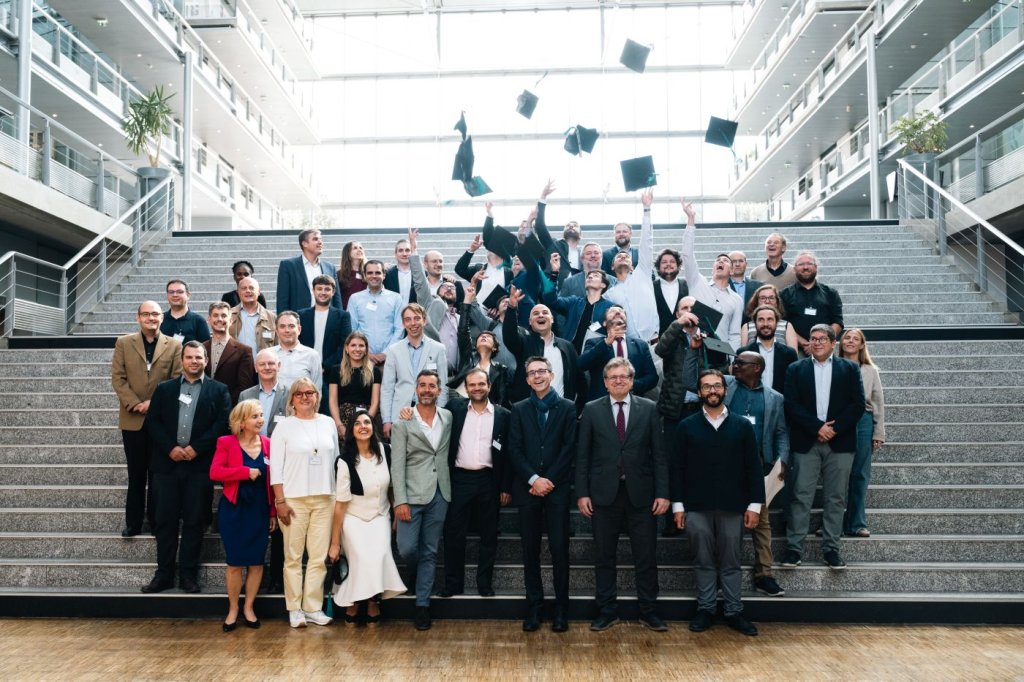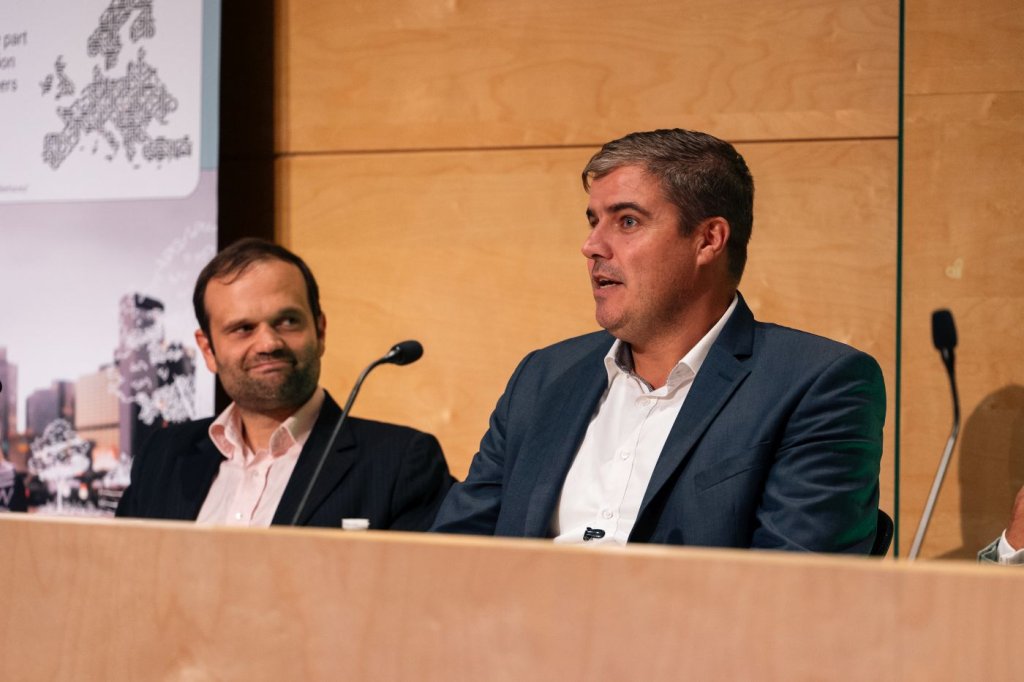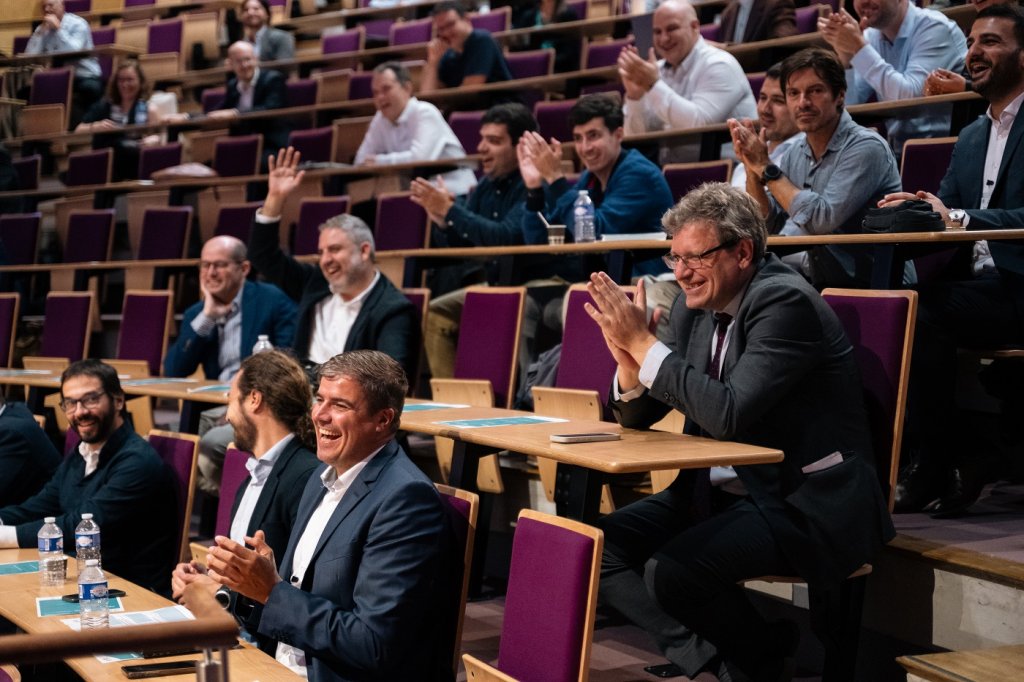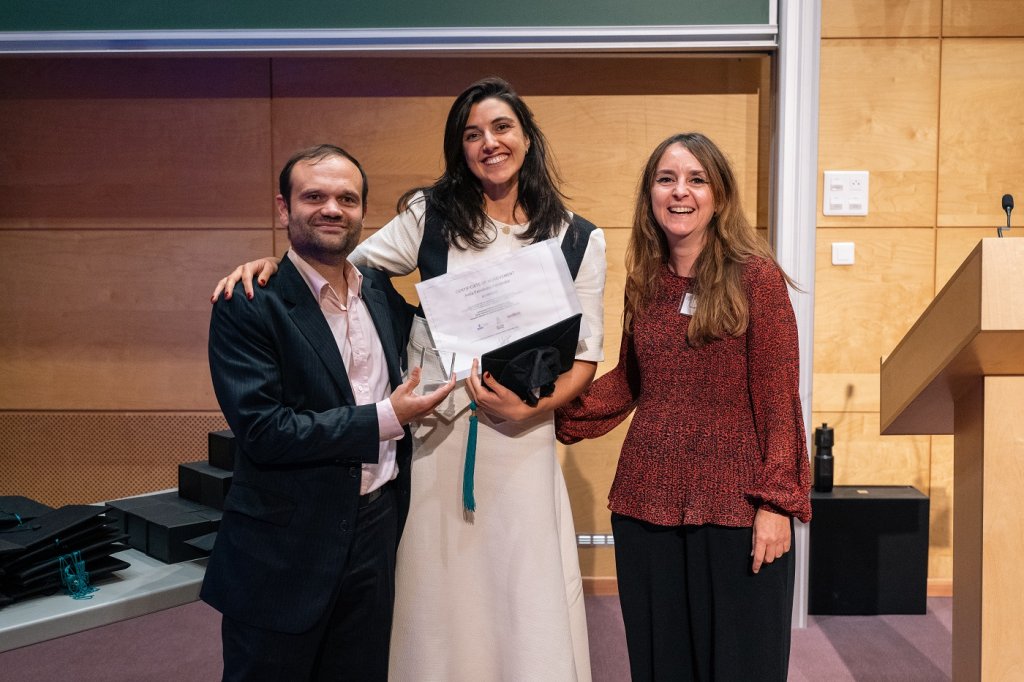On September 19th and 20th, École des Ponts ParisTech in Paris hosted the capstone project presentations and the Graduation Ceremony for the inaugural cohort of the Digital Twins Executive Master.
The Digitwin4CIUE project is an initiative under the European Union’s Digital Europe Programme, which aims to accelerate the digital transformation of society and the economy across Europe. The project focuses on advancing digital skills and integrating cutting-edge technologies within the civil engineering and construction sectors. One of the key components of this initiative is the Executive Master in Digital Twins for Infrastructures & Cities, a unique joint degree program offered by prestigious European institutions, including Universidad Politécnica de Madrid, École des Ponts ParisTech, Istanbul Technical University and BME.

Supported by the EELISA university alliance, this program blends online learning with in-person events hosted in Madrid, Paris, and Budapest. It is designed to train future leaders in the civil engineering and construction industries by providing them with hands-on experience in the use of digital twins and equipping graduates with the skills to lead the digital and green transformation in their fields. Through this collaborative and innovative approach, the program not only fosters academic excellence but also bridges the gap between industry and academia, ensuring a sustainable future for the construction sector.
| A digital twin is a virtual model, complex computer simulation of a real system, process, product or even service. The system creates the same parameters as the physical world and its conditions, updates them from real-time data, and uses simulation and machine learning to facilitate appropriate decision-making. By pairing the original and the virtual twin, it becomes possible to analyze real-time data using machine learning and monitoring systems. With this tool, certain problems can be prevented. In industry, stoppages can be avoided, maintenance can be scheduled, efficiency can be increased, and new developments can be tested before implementation. Based on the conclusions drawn, the actually implemented development will potentially be better functioning and more efficient. |
During the two days, the students presented six projects. (Although some participants could not be present in person, the thesis defenses were broadcast live, so everyone could watch the presentations. Thus, the nearly 30 students of the incoming cohort also got some insight into what awaited them at the training.)
1. Optimization of Scan2BIM Applied to the French Railway Infrastructure
Participants: Víctor Aparici Godoy, Fouad Harrag, Beatriz Crespo Martín, György Heusz. Mentors: Livaï Quintard, Anis Chaarana (Altametris). Coordinator: Nicolas Audebert (École des Ponts ParisTech)
2. Reliability of Asset Data through Remote Multi-Source Measurements
Participants: Juan Manuel Aguado López, Borja Bergara, Salihcan Karaman, András Nagy. Mentors: Maxime Gueguin, Daniel Chauveheid (Eurobios Mews Labs). Coordinator: Loïc Landrieu (École nationale des ponts et chaussées)
3. A Simulation of Wind Turbine Sensors Based on Real Data
Participants: Abba Mohammed Abubakar, Edmore Hamandishe. Mentor and Coordinator: Samy Z. (Siemens Gamesa)
4. Development of Dams – Digital Twin for safety management and operation
Participants: Luis Madruga, Iván Campos-Guereta Díez, Ángel Martín de la Sierra López Romero, David Cuenca-Velázquez. Mentors: Fidel San Emeterio, Carlos Rodríguez, Luis Castillo Cano-Cortés (Ayesa). Coordinators: Miguel Ángel Toledo Municio, Eduardo Salete (Universidad Politécnica de Madrid)
5. Digital Twin of a Bike Sharing Service: Optimising Operations through Artificial Intelligence
Participants: Alberto Navas, Iván Revilla Hernández. Mentors: Javier Burrieza Galán, Oliva Garcia Cantu Ros (Nommon). Coordinators: Natalia Sobrino Vázquez (UPM), Juan Benavente Ponce (Universidad de Cantabria)
6. Developing a Predictive Model of Mass Events
Participants: Antía Fernández, Pachi Cartelle. Mentors: Javier Burrieza (Nommon), Rodrigo Vázquez (INECO). Coordinator: Javier Vaca (CaminosUPM). Mentoring Companies: Nommon and INECO
A roundtable event was held to discuss the key aspects of the Digitwin4CIUE project. It was moderated by Sofía D’Aguiar (Executive Director of the EELISA). The panel included six notable speakers: Fernando García Molina (Coordinator of DigiTwin4CIUE project, UPM), Isabel Rosa (Responsable Financement de la Recherche et Dévelopement at Altametris), Cristian Dumitru Tranca (Vice Dean at UPB), Mathieu Arquier (Director of the Digital Twins for Infrastructures and Cities Executive Master, ENPC), Tamás Lovas (Associate Professor at BME), and Birgul Çolakoglu (Coordinator of MArch Program at ITÜ).

Tamás Lovas (right) at the roundtable
As part of this collaborative effort, the Centre of Excellence (CoE) for Digital Twins in Civil Infrastructures and Cities is being established, with BME playing an active role. The CoE will be built upon four key pillars: innovative research, knowledge-sharing, industry collaboration, and start-up development. These pillars aim to drive the adoption of digital technologies, enhance sustainability, and improve productivity in the construction sector across Europe, ensuring continuous progress and innovation in the field.

After the evaluations were completed, the event transitioned into the graduation ceremony. Students received temporary certificates, validating their accomplishments as they await their official joint degree, supported by the EELISA program. This degree will be signed by the rectors of École des Ponts ParisTech, Universidad Politécnica de Madrid, and BME.

Graduating from the inaugural cohort, Antía Fernández, who finished with the best score (center)
The celebration concluded with a gala dinner cruise on the Seine. BME congratulates to the first cohort, who embarked on this path with vision and resilience, and at the same time welcomes the next cohort, encouraging the exchange of ideas, industry challenges, and networking opportunities.
Rector’s Office, Communications Directorate

